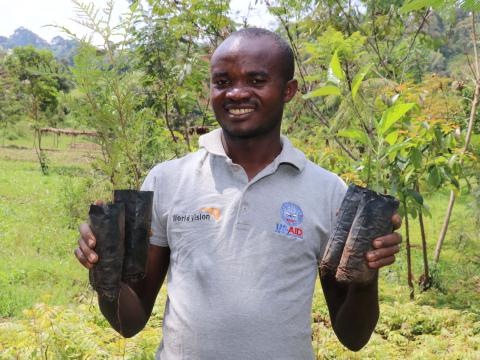The leadership of Chance KAFUNGA, role model of environmental protection in Kalehe

By Jean Baptiste Mirindi, Senior Communication Officer
Father of a family of 4 children, Chance KAFUNGA, 32 years old, is not discouraged to monitor the activities of maintenance of agroforestry tree seedlings and fruit trees in the nursery site of the association Environnement Sans Frontière (Environment Without Borders), ESF as a Coordinator.
His bravery is motivated by the improvement of environmental protection and the determination to never experience again repeated natural disasters as in previous years. "I had noticed a pressure of human activities on the environment which caused calamities causing loss of human life, material and devastated crops" , he regrets.
Chance KAFUNGA had a difficult life, he was not able to respond to the needs of his household at the end of the month. They ate once a day and he no longer thought about agriculture as a solution given that there was a strong degradation of the soil due to the massive deforestation of trees causing seasonal disturbance.
At that time, Chance created an association called Environnement Sans Frontière with the objective of sensitizing communities to environmental protection and facilitating access to agro-forestry tree seedlings in order to contribute to the progressive restoration of the environment.
Through his local association, he became aware of Food Security Project actions and he signed a partnership contract that will allow him to teach his members nursery management techniques and produce a large number of seedlings to feed the hills. In order to relaunch this association, the project paid 20% of their production, i.e. 2199$, which allowed them to buy a plot of land where they are building their office.
The high production of seedlings by his association encourages him to reforest the hills of Anastasie and Murambi accompanied by FSP as well as the agricultural feeder roads in villages exposed to high risk of disasters. "Before we could produce 15,000 seedlings per season and could generate 100,000 Congolese francs (50$), but now we are able to produce more than 270,000 agro-forestry and fruit seedlings thanks to the lessons on nursery management by FSP and can generate more than $2,250 depending on the demands of partners," he says with confidence and satisfaction.
Thanks to the income he earns from his association, Chance K. has changed his life by building a new house and many of his collegue’s children are in school and they are eating well. "I am happy that there is growth in agricultural production and food availability in my household, my children eat 3 times a day”, he says.
Born in Kalehe center in Eastern of Democratic republic of Congo, Chance K. confirms that almost all the farmers of his village get seedlings to reforest the hills and their fields in order to fight against the degradation of the soil and hope for good agricultural production.
To raise his income, he started to raise goats. He has now 7 goats. He opened his agribusiness production site for his wife which generates financial resources for his household. For his first production, he sold 35,000 seedlings to an organization for $2400. This activity allowed him to reforest his 2 hectares field with 400 seedlings.
In the eyes of Chance and his companions, is readable that they have ambition to improve the well-being of their communities, to make their fields profitable and to reduce malnutrition. " We are determined to reforest hills and high-risk areas to fight against natural disasters, contribute to the restoration of the soil and the green landscape on the developed hills“, he concludes.
The South Kivu Food Security Project (FSP), implemented by Mercy Corps and Word Vision in the health zones of Miti-Murhesa, Katana, and Kalehe, known locally as ENYANYA, supports USAID's strategic objectives for the Democratic Republic of the Congo (DRC) by working with households, community leaders, and the government of the DRC to improve the food and nutrition security and economic well-being of vulnerable households in South Kivu.